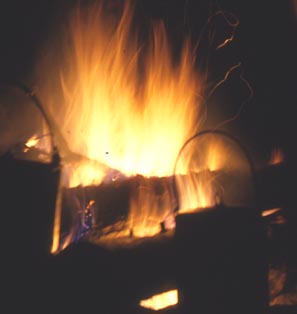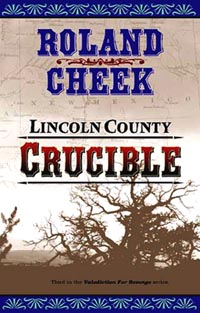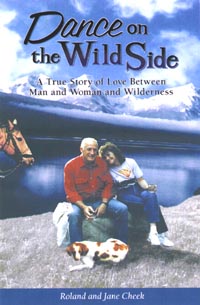a weblog sharing info on outdoor skills and campfire musing by a guy who spends a bunch of time in pursuit of both
CULTURE
WHERE -
TALES ARE TOLD OF
Welcome to Roland Cheek's Weblog
Roland is a gifted writer with a knack for clarifying reality. Looking forward to more of his wisdom
- Carl Hanner e-mail
I had a rose named after me and I was very flattered. But I was not pleased to read the description in the catalog: "No good in a bed, but fine against a wall."
By all means, marry. If you get a good wife, you'll become happy; if you get a bad one, you'll become a philosopher.
I was married by a judge. I should have asked for a jury.
To access Roland's weblog and column archives
Tip o' the Day
Cooking baked potatoes in the campfire is easier if you prebake them about three-quarters done at home. Wrap in foil, then finish in campfire coals. The upside is that it won't take as long in the fall.
Take along some big plastic bags for camp garbage. Even if you use burlap oat sacks, the plastic bags will keep the throw-aways from oozing.
A good hot weather tip is to cover your ice chest with a sleeping bar or two during the day. No, no -- it's not to keep the chest warm, but to keep it cool -- provided you cover it early in the day, while the ambient air temperature is still cool. And keep the chest in the shade.
Jane repackages from jars to plastic as much as possible, or purchases foods already packaged in plastic. There are plastic canisters for peanut butter and squeeze bottles of good-tasting jams and jellies.
She packages individual salads in Seal-A-Meal bags: three-bean, pasta, marinated corn.
And she pre-cooks roasts, hams, and sometimes chicken, packages the meat in zip-lock bags and freezes it to ward off spoilage. All the above saves an unbelievable amount of weight for a float trip, or horseback packtrip.
Years ago we did it differently -- lots of jars and cans and fresh meat, whole potatoes, and store-bought pastries and cookies. Then she tried repackaging from jars and found she could eliminate 35 pounds of glass from one of our eight-person, ten-day hunting trips. By precooking much of the meats, she cut one-quarter of that weight and by packaging in zip-lock and freezing, there was no apparent loss in flavor.
While we were still guiding professionally, Jane baked all our wilderness trip cookies at home -- 320 dozen (3,840) homemade cookies for one season alone! All were baked and packaged for each individual trip, then stored in our freezer for timely use.
Desserts were tasty stir-and-serve pie fillings poured into already prepared cut-and-serve crusts. Or it was a stir-and-bake cake cooked in a Dutch oven.
In those days Jane's efficiency was readily apparent when she put together a hot, tasty, full-course meal ready for a troop of hungry guests, guides and their outfitter only an hour after pulling into some secluded and undeveloped campsite.
Echoes of Vengeance -- A military outpost situated in an isolated region of the Department of the Upper Missouri. An embittered Commandant who believes unkind fate kept him from fame and glory during the recent War of Seccession. A band of starving Blackfeet too riddled with smallpox to withdraw to their reservation. A young mixed-blood army interpreter whose aging parents are with the Blackfeet tries to prevent a massacre-in-the-making; he's beaten and dragged to the guardhouse for the attempt.
Thus the stage is set and principal characters in place for the opening pages of Echoes of Vengeance * Mule Milk News /Official Newsletter of the Montana Outfitters and Guides Association
INCOMPLETE POLICE REPORT
I'm not much into reading police reports in local newspapers. The reason, of course, is because it usually makes for less than riveting reading.
Any appetite I've developed for following local criminal mischief was whetted during my guiding years by outsiders. Occasionally I led folks from Philadelphia or Los Angeles to adventure. Sometimes those guests bought a local newspaper--might even have subscribed to the Hungry Horse News or The Daily Interlake--before returning home. Almost to a person, they reacted with glee in comparing my valley's evil-doers with those from their own hometowns. Somehow, though I never quite got the drift of humor they saw in a report that might read: "Police on Thursday checked out reports of a suspicious vehicle at Central School and could not find anything."
Naturally any enthusiasm for my following the local police blotter was blunted by the fact that anything really salacious automatically made it to the front page, like those daring ladies who shed their clothing and streaked down the main street of Whitefish when the clock struck twelve at the latest millennium turn.
There was, however, one recent police report upon which I pondered. It was fronted by an outsized headline:
ELK HERD DISTURBS HOMEOWNERS' LIVESTOCK
But when I zeroed in on its details the report was altogether too brief, reporting only that Flathead County Sheriff's deputies asked a game warden to talk to residents of a rural lane after they'd complained about 50 head of elk bothering their horses.
That was all! It's the age old bain of police reports. . . .
I wanted to know more. How were the elk bothering the horses? How many horses were there? What did the residents want the sheriff's deputies to do? What did the deputies expect the game warden to do? What did the game warden say to the residents about their harassed horses? See what I mean, there's a real lack of in-depth reporting in police reports.
Maybe it's not a policeman's job to write comprehensive newspaper copy. But what can we say in defense of a copywriter who transferred the police report about nefarious deeds, but who failed to garner the "who," "what," "where," "how," and "when" of such a shocking crime scene. Without reportorial follow-up and investigative journalism, we're left hanging.
I had a vital interest in the elk-chasing-horses incident and because of sloppy assignments by some obscure and uncaring editor I was left in the dark. The reason I was interested was because, at the time, I kept four horses. It was my practice during storm-prone winter months to feed hay to those horses in a patch of woods. Earlier that winter, Jane and I spotted four elk in those woods. I needed to know if I should develop a contingency plan in case those four elk started harassing my four ponies.
Some years ago a herd of elk broke into an 80-acre pasture where I kept 28 head of horses- when those steeds weren't traveling the Bob Marshall Wilderness. If those 22 elk had evil intent on their minds, they were soon disuaded from same because when Jane and I chanced to drive by the pasture, those wapiti were in full retreat, chased by all 28 of our wilderness savvy horses.
Maybe those elk thought my packstring steeds too formidable in a face-to-face encounter--gangland rumbles Montana style!
Or maybe those police report cayuses harassed by the herd of elk were pure-D wimps.
But I do remember murmuring to Jane as we watched that herd of 22 wapiti head Mazatlan-way in full flight from my veteran nags: "So that's why our hunters can never find any elk--our damned horses keep running them out of the country!"
Roland Cheek wrote a syndicated outdoors column (Wild Trails and Tall Tales) for 21 years. The column was carried in 17 daily and weekly newspapers in two states. In addition, he scripted and broadcast a daily radio show (Trails to Outdoor Adventure) that aired on 75 stations from the Atlantic seaboard to the Pacific Ocean. He's also written upwards of 200 magazine articles and 12 fiction and nonfiction books. For more on Roland, visit:
www.rolandcheek.com
Recent Weblogs
Tuesday, March 3, 2009
There's a bunch of specific info about Roland's books, columns, archives and radio programs. By clicking on the button to the left, one can see Roland's synopsis of each book, read reviews, and even access the first chapter of each of his titles. With Roland's books, there's no reason to buy a "pig in a poke."
for detailed info about each of Roland's books
Read Reviews
Read their first chapters
For interested educators, this weblog is especially applicable for use in history, economic, and government classes, as well as for journalism students.
Roland, of course, visits schools. For more information on his program alternatives, go to:
NEXT WEEK:
GROWING OLDER IN A TECHNO WORLD
www.campfireculture.com
Roundup Magazine says of The Silver Yoke, the final book in the acclaimed Valediction For Revenge series: This novel has lots of action, a terrific villain you love to hate, the smell of dust and dynamite, and a man sworn to bleed his enemies, not of blood but of money, the only thing they love.
This is another page turner from Cheek with characters that possess all three dimensions and are tough to kill. Any readers who likes action, adventure, and a plot with more twists than a sidewinder will love Gunnar's Mine * Roundup Magazine
Lincoln County, New Mexico, where poor farmers and ranchers are at the mercy of crooked merchants, the military, and a corrupt territorial government run by something called the "Sante Fe Ring," But who are the "good" guys? Billy the Kid? John Chisum?
Book three in the Valediction For Revenge series, the completion of Jethro Spring's adventures in New Mexico
Crisis On the Stinkingwater is Cheek's darkest book. It is also the most realistic. The portrayal of the depth of hatred engendered by the bitter conflict between rancher and homesteader chills the reader * Roundup Magazine
Two books -- one about the people, the second about their place of adventures
For detailed information about Roland's books
source links for additional info
to visit Roland's newspaper columns and weblog archives
to send this weblog to a friend
to tell Roland what you think of his Campfire Culture weblog
- Eleanor Roosevelt
- Socrates
- Groucho Marx










